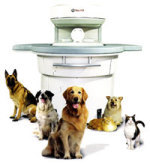by
Michael Johns, Project Manager | July 07, 2006

Animals now receive
MRIs and CT scans
If you care about animals, enjoy working with your hands, are good at basic math and decision-making, like working with people and handling a variety of responsibilities, then the challenging career of veterinary technology may be just right for you.
Duties and Responsibilities
The veterinary technician is an integral member of the veterinary health care team who has been educated in the care and handling of animals, the basic principles of normal and abnormal life processes, and in routine laboratory and clinical procedures. All veterinary technicians work under the supervision of a licensed veterinarian. While a veterinary technician can assist in performing a wide variety of tasks, they cannot diagnose, prescribe, perform surgery, or engage in any activity prohibited by a state's practice act.
In Private Practice
A veterinary technician employed in a veterinary clinic or hospital handles many of the same responsibilities that nurses and other professionals perform for physicians. They are trained to:
- Obtain and record patient case histories
- Collect specimens and perform laboratory procedures
- Provide specialized nursing care
- Prepare animals, instruments, and equipment for surgery
- Assist in diagnostic, medical, and surgical procedures
- Expose and develop radiographs
- Advise and educate animal owners
- Supervise and train practice personnel
- Perform dental prophylaxes
In Biomedical Research
In addition to the responsibilities above, veterinary technicians employed in a biomedical research facility perform other duties under the supervision of a licensed veterinarian, a biomedical research worker, or other scientist:
- Supervise the humane care and handling of research animals
- Assist in the implementation of research projects
Career Opportunities
While the majority of veterinary technicians are employed in private practice, the demand for technicians is rapidly expanding to include new employment opportunities in both human and animal health-related fields such as:
- Biomedical research
- Diagnostic laboratories
- Colleges/Universities
- Zoos and wildlife facilities
- Military service
- Drug and feed manufacturing companies
- Food safety inspection
\t
Education
The American Veterinary Medical Association (AVMA) accredits veterinary technician programs throughout the U.S. that are conducted in laboratory or clinical settings involving the humane use of live animals. Most AVMA-accredited programs lead to an associate' degree after two years but some lead to a four-year baccalaureate degree. Students earning a baccalaureate degree usually receive higher salaries and greater level of job responsibilities.
